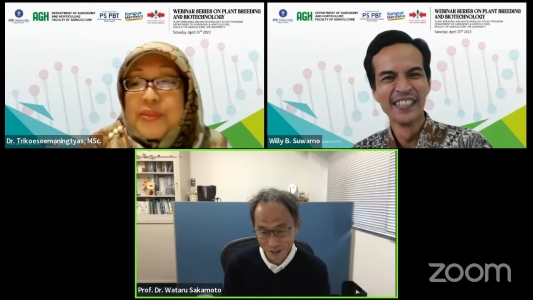Department of AGH IPB University Held a Webinar Series on Plant Breeding and Biotechnology, and Invited Four Biotechnology Experts

The Department of Agronomy and Horticulture (AGH), Faculty of Agriculture (Faperta) IPB University held an online Webinar Series on Plant Breeding and Biotechnology, (15/4). Prof Suryo Wiyono, Dean of Faperta IPB University said this activity was important for sharing insights regarding plant breeding and strengthening synergy between academia, industry and institutions.
“Plant breeding plays an important role in increasing productivity in the midst of climate change which has an impact on limited resources. The experts present here have an important role to provide each other with solutions to these problems," he said.
Prof Edi Santosa, Head of the AGH IPB University Department also said that plant breeding and biotechnology are the engines of the future. "We depend on plant breeding and biotechnology to meet our needs for food, fuel and fiber," he said.
Four speakers were presented at this activity, including Prof Wataru Sakamoto (Institute of Plant Science and Resources, Okayama University) who explained about the exploitation of sorghum from Africa with cutting-edge genome technology, Muryanto Paiman MSi, (Biotechnology Laboratory Manager, PT East West Seed Indonesia) presented a genome-based approach to accelerate the release of varieties for Indonesian farmers, as well as Dr Trikoesoemaningtyas and Dr Awang Maharijaya, Lecturers at IPB University from the AGH Department.
In this activity, Dr Trikoesoemaningtyas provided important notes on the sorghum breeding program to increase its efficiency.
"Based on our research experience, there are several important notes to increase the efficiency of sorghum breeding due to limited land and workers, namely the need for early generation testing, rapid generation advanced, fast phenotyping and pre-breeding activities," he explained.
He explained, this record was obtained based on the results of a study by IPB University from 2007 until now to improve the quality of sorghum grains and productivity. "Ten superior varieties of sorghum have been issued by IPB University and have passed a series of multi-location tests to characterization," he said.
Meanwhile, Dr Awang Maharijaya explained the mechanism of insect resistance in chili plants through molecular and metabolomic approaches. This approach is aimed at overcoming losses due to crop failure due to thrips.
"Breeding that emphasizes resistance ability is very important to be included in an integrated pest management program so that it can reduce losses and increase productivity," he explained. (MW/Rz) (IAAS/Res)



